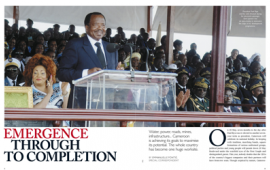EMERGENCE THROUGH TO COMPLETION

On 20 May, seven months to the day after Paul Biya was re-elected to another sevenyear term as president, Cameroon will celebrate its national holiday. In keeping with tradition, marching bands, square formations of various uniformed groups, political parties and young people will parade down 20 May Boulevard under the watchful eyes of the First Couple and distinguished guests. This year, nobody doubts that the CEOs of the country’s biggest companies and their partners will have front-row seats. Though sceptical by nature, Cameroonians admit that the president has kept his word on his development programme. After “Big Ambitions”, the time for “Big Projects” announced during the 2011 campaign is here. The construction of “anchor” projects is in full swing. Most of the road infrastructure, such as the Ayos-Bertoua, Obala-Nanga Eboko or Sangmélima-Ouesso-Brazzaville motorways, have been or are nearly completed. Funding for the new DoualaYaoundé motorway is a done deal. The same goes for most of the gas-fired power plants, hydroelectric dams, water supply or treatment facilities, Kribi industrial-port complex, Lom Pangar Dam and Mbalam iron mine, which are scheduled for delivery within one or two years.
SLOWLY BUT SURELY The blockbuster schemes’ social spin-offs are gradually rippling through the country. Regions like the East, with a new road and the huge Lom Pangar project, are opening up. New jobs are being created. Power plants nearing completion and emergency programmes carried out at the same time are easing electricity shortages. Before the first turn of the spade, the big projects were preceded by long periods of preparation to draft designs and arrange funding. Like anywhere else, people started expressing their impatience. Weary of waiting for the much-trumpeted benefits of a new road or dam, Cameroonians lost interest. As usual, from Kousséri to Ebolowa, they preferred commenting on the country’s judicial and political news, including, first and foremost, the pursuit of operation Sparrowhawk, with the incarceration of two former regime heavyweights and faithful collaborators of the president, Marafa Hamidou Yaya and Ephraïm Inoni, two of the latest to fall in the fight against corruption, symbols if any were needed of Mr. Biya’s determination to track down people who participated in the purchase of a defective presidential plane, the Albatross, delivered in 2004. The aircraft, whose acquisition is said to have involved the embezzlement of funds, nearly cost the First Couple their lives during its 2004 maiden flight. “Say what you will,” comments a young journalist in Yaoundé, “Mr. Biya is a man of his word. Nobody was spared, not even companions from day one like minister Marafa. He said everybody mixed up in the affair would pay the price. It took time, but he followed through.” Moreover, in mid-April the Assembly took up reform of the 299-article electoral code, which was eventually amended after heated debate and opens up a new era by implementing biometric identification technology for future elections and overhauling the voter rolls. Several people close to the government say other changes, such as the reation of a Senate, will probably follow those long-awaited advances. “Slowly but surely could be the country’s and the president’s motto,” a member of the government says. “Scandals, reforms and building sites taught Cameroonians patience. Sometimes they lost heart, stopped believing. But the projects are moving forward. And I think we’re building the Cameroon of tomorrow with a certain determination.” The master plan is clear: the big projects should simultaneously meet many social expectations by creating jobs, increasing access to basic services, cutting costs, fostering exchanges, boosting trade and making Cameroon, whose prime assets are peace and a huge potential, a competitive country that attracts foreign investors. “We must resolutely turn Cameroon into a worksite of emergence, in other words a country that creates wealth and redistributes it equitably, offers everybody equal opportunity and enjoys strong, sustainable growth and food security, in short a country of happiness for each and all,” Mr. Biya said during his last inaugural speech. It seems as though the “worksite of emergence” promise has been kept: various projects are underway nationwide. However, social progress still has a way to go. Cameroonians nurture increasingly high expectations, particularly with regard to healthcare and the high cost of living. But that, too, is the challenge of the big projects.
BY Emmanuelle PONTIÉ, SPECIAL CORRESPONDENT